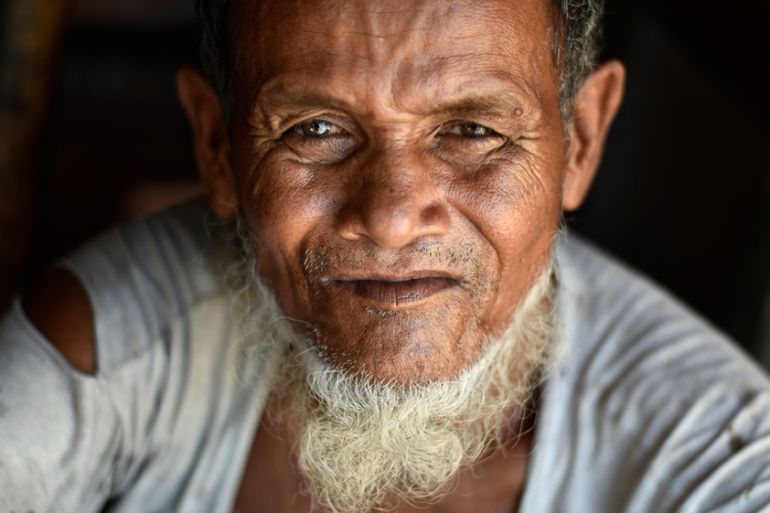Over 1,000 Rohingya flee India for Bangladesh fearing crackdown
Activists ask India to honour principle of “non-refoulement” as Hindu far right calls for mass deportation of Rohingya.

At least 1,300 Rohingya have crossed into Bangladesh from India since the start of the year, an official said on Wednesday, as fears of deportation to Myanmar spark an exodus.
New Delhi has faced sharp criticism for turning Rohingya people over to Myanmar in the past months, despite the members of the persecuted minority facing threats to their safety there, with the United Nations and rights groups accusing India of disregarding international law.
Keep reading
list of 4 itemsConflict, climate, corruption drive Southeast Asia people trafficking: UN
Bodies of three Rohingya found as Indonesia ends rescue for capsized boat
How is renewed violence in Myanmar affecting the Rohingya?
India, which is not a signatory to the UN Refugee Convention, arrested 230 Rohingya in 2018 – the highest number in years – as Hindu nationalists called for the Rohingya to be deported en masse.
“For the past year, the government of India has been making life difficult for the Rohingya refugees in India”, Ravi Nair, of the South Asia Human Rights Documentation Centre (SAHRDC), told Al Jazeera.
Nair said India must honour the principle of “non-refoulement” – the practice of not forcing refugees or asylum seekers to return to a country in which they can be subjected to persecution.
He said that the Rohingya in India are subjected to “regular visits by local intelligence officials, this includes harassment about their paperwork.
“A large number of Rohingya, our own data shows over 200, from Jammu to Tripura, Assam and West Bengal states have been arrested and imprisoned,” he said.
The round-ups in India and fear of deportation to Myanmar have driven even more of the stateless Rohingya into Bangladesh, where a million already live in sprawling refugee camps in the country’s southeast.
Increase in new arrivals
Nayana Bose, a spokeswoman for the Inter Sector Coordination Group (ISCG), which includes UN agencies and other foreign humanitarian organisations, said the pace of new arrivals to Bangladesh had increased since January 3.
|
|
“Some 1,300 individuals from 300 families have arrived from India to Bangladesh until today,” she told the AFP news agency.
UNHCR spokesman Firas Al-Khateeb said the UN refugee agency was “aware of the situation”.
Those crossing the border in recent weeks have been intercepted by police and sent to Cox’s Bazar, a southern district home to the world’s largest refugee camps.
Some 40,000 Rohingya are believed to have taken shelter in India over the years. Bangladesh police said those who arrived at the borders had been living in India for a long time.
Humanitarian law
Rohingya for decades have faced persecution in Myanmar, which refuses to recognise them as citizens and falsely labels them “Bengali” illegal immigrants.
They were concentrated in Rakhine state, the epicentre of a brutal Myanmar army offensive in August 2017 that UN investigators described as genocidal in intent.
At least 720,000 Rohingya fled the bloody crackdown and entered Bangladesh to join some 300,000 already living in camps there.
Amnesty International, among other rights groups, has blasted India for forcibly repatriating the Rohingya to Myanmar when persecution in Rakhine is ongoing.
![The Rohingya refugee camp in Cox's Bazar district is among the largest in the world [Malavika Vyawahare/Al Jazeera]](/wp-content/uploads/2018/12/933fd14cd333453d848586875f17479a_18.jpeg)
The Oxford Human Rights Hub has said India and its Supreme Court were in “breach of several international human rights obligations” when it decided to deport the Rohingya asylum seekers in October 2018.
“Amidst the rising tide of Hindu nationalism, this decision raises cause for concern,” it said.
Nair of SAHRDC added: “The Bangladesh foreign minister is expected here next week, and we hope he will take this up strongly with India.”
Though an overwhelming majority of Rohingya refugees is based in Bangladesh, tens of thousands of them have also taken shelter in other countries.
Last week, dozens of Rohingya were deported from Saudi Arabia to Bangladesh. They were arrested for illegally using Bangladeshi passports to travel to the kingdom.
Zeenat Saberin contributed to this report from New Delhi.